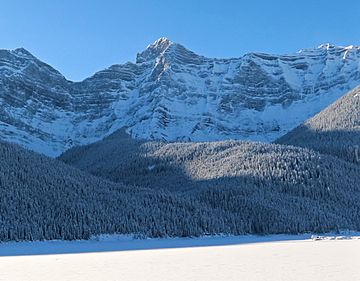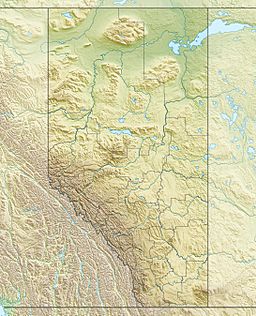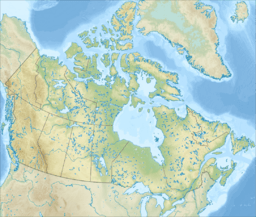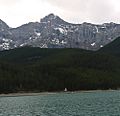Mount Sarrail facts for kids
Quick facts for kids Mount Sarrail |
|
|---|---|

Mount Sarrail seen from the north
|
|
| Highest point | |
| Elevation | 3,159 m (10,364 ft) |
| Prominence | 269 m (883 ft) |
| Parent peak | Mount Foch (3194 m) |
| Geography | |
| Location | Alberta, Canada |
| Parent range | Canadian Rockies |
| Topo map | NTS 82J/11 |
| Geology | |
| Age of rock | Cambrian |
| Type of rock | Limestone |
| Climbing | |
| First ascent | 1930 Katie Gardiner, Walter Feuz |
| Easiest route | Scrambling |
Mount Sarrail is a tall mountain in Kananaskis Country, Alberta, Canada. It stands at 3,159-metre (10,364-foot) high. This mountain is part of the amazing Canadian Rockies.
Mount Sarrail is found inside Peter Lougheed Provincial Park. It is very close to the Continental Divide. You can easily spot Mount Sarrail from Upper Kananaskis Lake. It is also visible from Alberta Highway 40.
Contents
Mountain History
How Mount Sarrail Got Its Name
The mountain was named in 1918. It was named after a French general named Maurice Sarrail. He was a commander in the French army during World War I. This was a very big war that happened a long time ago.
The name was officially accepted in 1924. This was done by the Geographical Names Board of Canada.
First Climbers of Mount Sarrail
The first people to climb Mount Sarrail were Katie Gardiner and Walter Feuz. They reached the top in 1930. That same year, they also climbed two other nearby mountains. These were Mount Foch and Mount Lyautey.
Mountain Geology
What Mount Sarrail is Made Of
Mount Sarrail is made of sedimentary rock. This type of rock forms from layers of sand, mud, and tiny bits of sea creatures. These layers build up over a very long time.
The rocks of Mount Sarrail were formed in shallow seas. This happened during the Precambrian to Jurassic periods. Later, huge forces deep inside the Earth pushed these rocks. This pushing caused the rocks to fold and rise up. This is how the mountain was formed.
Mountain Climate
Weather at Mount Sarrail
Mount Sarrail has a subarctic climate. This means it has very cold and snowy winters. The summers are usually mild. Temperatures can drop below −20° C. With the wind, it can feel even colder.
Best Time to Visit
The best time to climb Mount Sarrail is from June through September. The weather is usually nicer during these months. Water from the mountain flows into streams. These streams then join the Kananaskis River.
Gallery
 | Janet Taylor Pickett |
 | Synthia Saint James |
 | Howardena Pindell |
 | Faith Ringgold |








